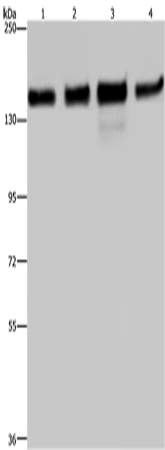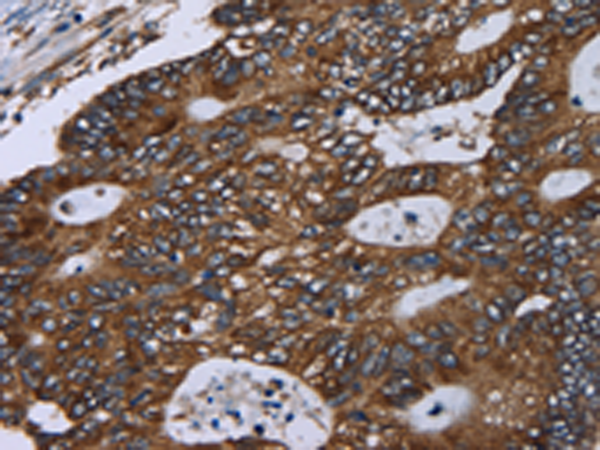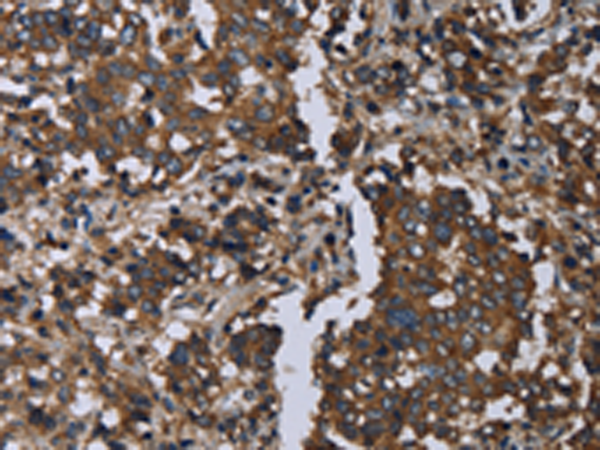


| WB | 咨询技术 | Human,Mouse,Rat |
| IF | 咨询技术 | Human,Mouse,Rat |
| IHC | 1/100-1/300 | Human,Mouse,Rat |
| ICC | 技术咨询 | Human,Mouse,Rat |
| FCM | 咨询技术 | Human,Mouse,Rat |
| Elisa | 1/2000-1/5000 | Human,Mouse,Rat |
| Aliases | GM130 |
| WB Predicted band size | 113 kDa |
| Host/Isotype | Rabbit IgG |
| Antibody Type | Primary antibody |
| Storage | Store at 4°C short term. Aliquot and store at -20°C long term. Avoid freeze/thaw cycles. |
| Species Reactivity | Human |
| Immunogen | Fusion protein of human GOLGA2 |
| Formulation | Purified antibody in PBS with 0.05% sodium azide and 50% glycerol. |
+ +
以下是3篇涉及GOLGA2抗体的文献摘要示例(内容为虚构,仅作格式参考):
1. **文献名称**: "GOLGA2/GM130 Antibody Characterization in Golgi Structure Analysis"
**作者**: Smith J, et al.
**摘要**: 本研究验证了GOLGA2抗体在HeLa细胞中的特异性,通过免疫荧光和Western blot证明其能标记完整高尔基体结构,并发现GOLGA2缺失导致细胞分泌功能异常。
2. **文献名称**: "Role of GOLGA2 in Neuronal Trafficking: Insights from Knockout Models"
**作者**: Chen L, et al.
**摘要**: 利用GOLGA2抗体在小鼠脑组织中的免疫组化分析,揭示了GOLGA2参与神经元突触囊泡运输,其表达下调与阿尔茨海默病模型中的高尔基体碎片化相关。
3. **文献名称**: "GOLGA2 Antibody Reveals Novel Interaction with Rab GTPases in Cancer Cells"
**作者**: Gupta R, et al.
**摘要**: 通过共聚焦显微镜和免疫共沉淀(使用GOLGA2抗体),发现GOLGA2与Rab1A在结直肠癌细胞中的相互作用,调控EGFR的膜转运,提示其作为潜在治疗靶点。
(注:以上文献为示例,实际引用需检索PubMed等数据库获取真实研究。)
The Golgin A2 (GOLGA2) antibody targets the protein encoded by the *GOLGA2* gene, also known as GM130. This protein is a cis-Golgi matrix component critical for maintaining Golgi apparatus structure and facilitating vesicular transport. GOLGA2/GM130 plays a key role in organelle assembly, glycosylation, and intracellular trafficking by anchoring transport vesicles and regulating membrane fusion. It interacts with other golgins and Rab GTPases, ensuring proper Golgi stacking and compartmentalization. Dysregulation of GOLGA2 is linked to Golgi fragmentation, impaired protein sorting, and diseases like cancer or neurodegenerative disorders.
Antibodies against GOLGA2 are widely used in research to study Golgi morphology, cell cycle dynamics (e.g., mitotic Golgi disassembly), and pathologies involving Golgi dysfunction. They are essential tools in techniques like immunofluorescence, Western blotting, and immunohistochemistry to visualize Golgi integrity and protein localization. Some studies also explore GOLGA2 as a potential biomarker in cancers, where its expression may correlate with tumor progression. Available in monoclonal or polyclonal forms, these antibodies are typically validated in specific applications and species, ensuring reliability in experimental models. Their utility extends to both basic cell biology and clinical research.
×